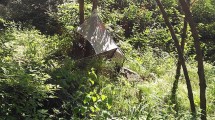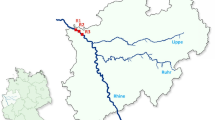Abstract
THE incidence of trypanosome infections in wild populations of tsetse flies (Glossina morsitans West (Muscidae: Diptera)), varies from one locality to another, and seasonal changes also occur. The method hitherto used to determine infection-rates has been the dissection of samples of live flies as described by Lloyd and Johnson1. This has the disadvantage of requiring the establishment of a team of microscopists in the bush, so that examination of simultaneously collected samples over wide areas is difficult. The recognition of trypanosomes in the mouthparts of preserved wild Glossina is not possible because regurgitation of stomach contents, which may occur when the insect is placed alive in the preservative, renders many of them opaque.
This is a preview of subscription content, access via your institution
Access options
Subscribe to this journal
Receive 51 print issues and online access
$199.00 per year
only $3.90 per issue
Buy this article
- Purchase on Springer Link
- Instant access to full article PDF
Prices may be subject to local taxes which are calculated during checkout
Similar content being viewed by others
References
Lloyd, L. I., and Johnson, W. B., Bull. Entomol. Res., 14, 265 (1924).
Author information
Authors and Affiliations
Rights and permissions
About this article
Cite this article
SIMMONDS, A., LEGGATE, B. A Survey Method of Trypanosome Infections in Glossina. Nature 194, 1297–1298 (1962). https://doi.org/10.1038/1941297b0
Issue Date:
DOI: https://doi.org/10.1038/1941297b0
Comments
By submitting a comment you agree to abide by our Terms and Community Guidelines. If you find something abusive or that does not comply with our terms or guidelines please flag it as inappropriate.



